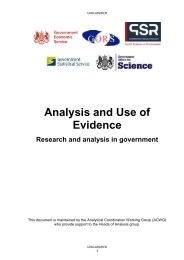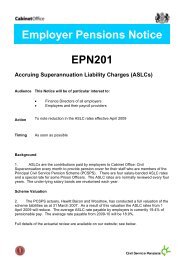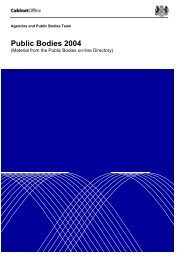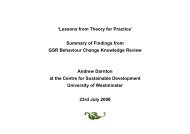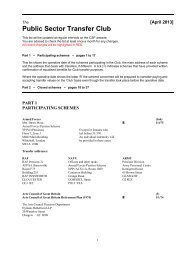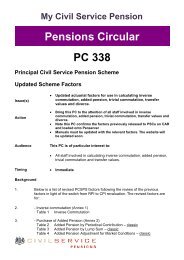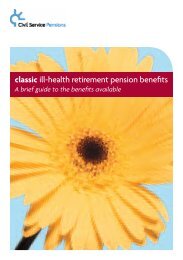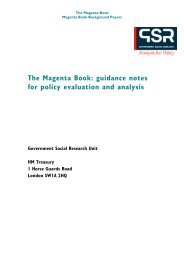Making Car Sharing and Car Clubs Work - Case ... - The Civil Service
Making Car Sharing and Car Clubs Work - Case ... - The Civil Service
Making Car Sharing and Car Clubs Work - Case ... - The Civil Service
You also want an ePaper? Increase the reach of your titles
YUMPU automatically turns print PDFs into web optimized ePapers that Google loves.
MAKING CAR SHARING AND CAR CLUBS WORKCASE STUDY SUMMARIESthe programme accordingly. <strong>The</strong> response was positive, but will take time to develop<strong>and</strong> implement (note: this function is available within the Jambusters software, <strong>and</strong> isawaiting deployment at GCHQ). In the interim, GCHQ used postcodes to plot the homelocations of staff, <strong>and</strong> introduced its own simple computerised lift matching servicebased on ‘nodes’. Those looking for car share partners enter the nodes (cities, towns,villages) they pass through or near en route to <strong>and</strong> from work, <strong>and</strong> the system identifiesothers who have entered at least one of the same nodes. This increases the chancesof finding potential sharers significantly. In addition to matching car sharers, the systemis also used by those seeking one-off lifts, e.g. those whose usual car share partner isunavailable due to illness, holidays, etc.<strong>The</strong> ‘gold bonus’ space allocation system has not been without its problems. Spacesare allocated on a first-come-first-served basis, <strong>and</strong> people could book them up to sixmonths in advance. It has proved very difficult to balance between the ‘hoarding’ ofspaces for ‘rainy-days’ with resultant empty spaces, <strong>and</strong> ‘panic-booking’ at the end ofperiods. To manage this, space allocations have been reduced for the remainder of theinterim period.<strong>The</strong> several hundred contractors employed by GCHQ were excluded from the interimrainbow parking allocation scheme, owing to space constraints <strong>and</strong> the need toencourage staff themselves to buy-in to the scheme. <strong>The</strong>se are individuals who havespecialists skills, required on an ad hoc basis, <strong>and</strong> some have done work for theorganisation for over 20 years. <strong>The</strong>y feel resentful that they were not consulted whenthey scheme was developed, <strong>and</strong> some feel they were not specifically advised aboutthe alternatives to parking on site that were evolving. In the event, however, a numberof the main contractor organisations have made their own arrangements, such aspurchasing parking at local hotels. Business has been judged as not having beendamaged, <strong>and</strong> the exclusion of contractors is to continue in the future RainbowScheme.Supporting Measures / Alternative Approaches Considered3.13 <strong>The</strong> following supporting measures have been introduced to encourage car/parking spacesharing among GCHQ staff:A guaranteed ride home in an emergency, covered by a contract with a local taxi firm(guidelines about using this facility have been draw up, <strong>and</strong> are available on the GCHQintranet site).Information to parents who drop children off at school en route to/from work of othercolleagues who use the same school(s), to enable lift sharing arrangements to beestablished.A car share newsgroup, to exchange information about the scheme, such as theavailability of ‘spare’ spaces.In addition to its support for car/parking space sharers, other measures to encouragealternatives to single occupancy car use have been put in place include:<strong>The</strong> appointment of ‘pathfinders’ (more below) to assist individuals to explore the rangeof options for commuting available to themFinal V1.1, Dec. 2004 - 17 -





